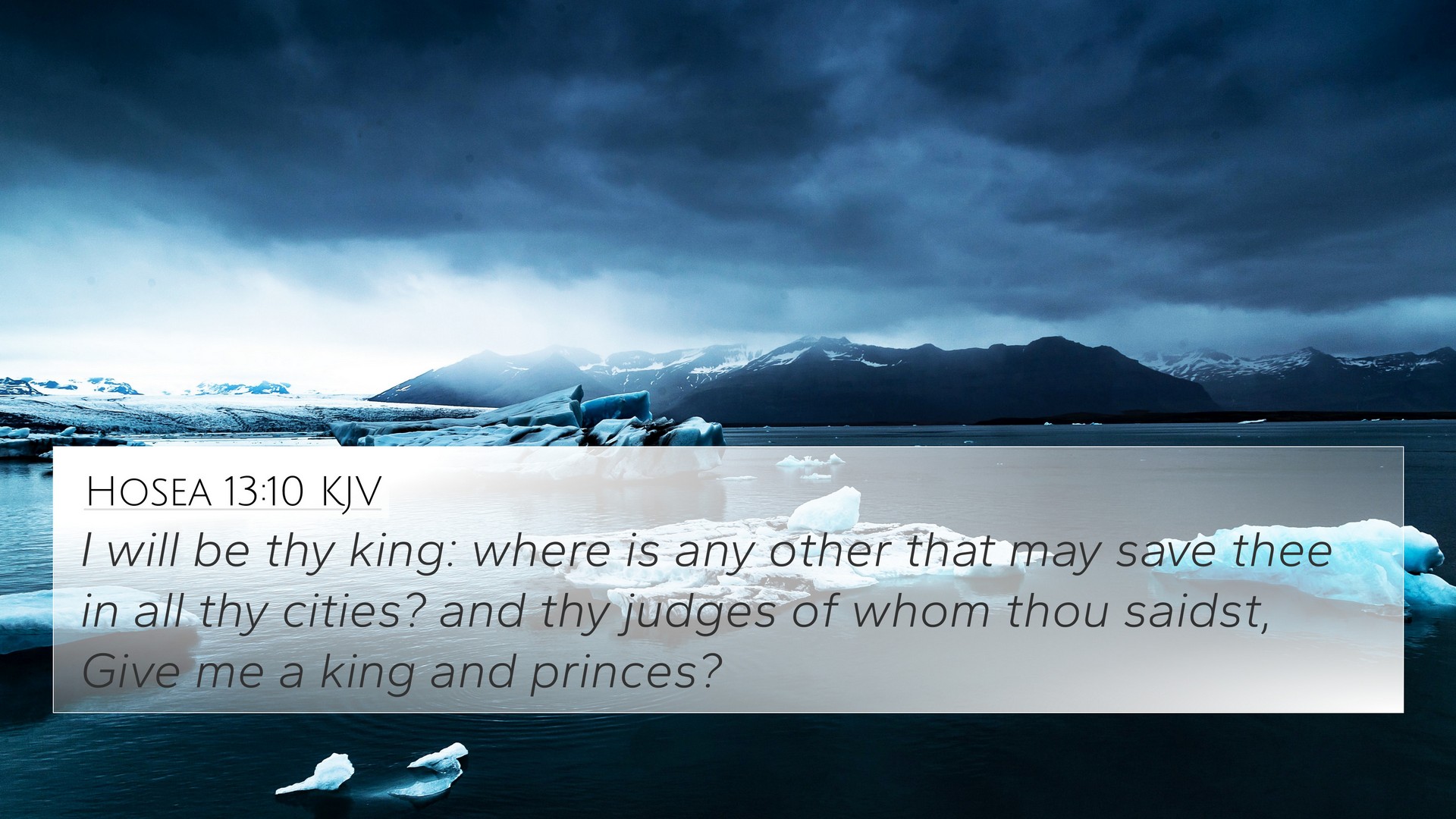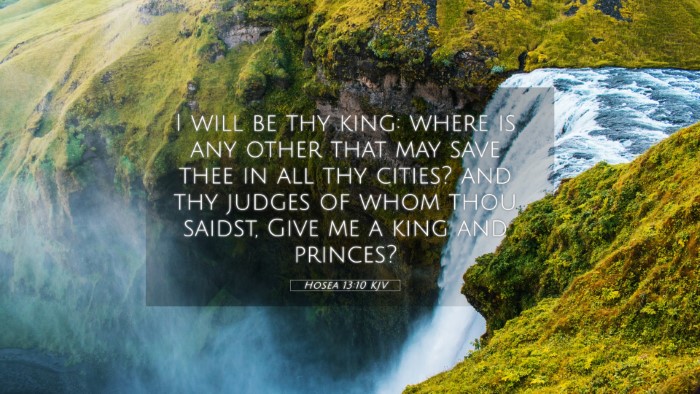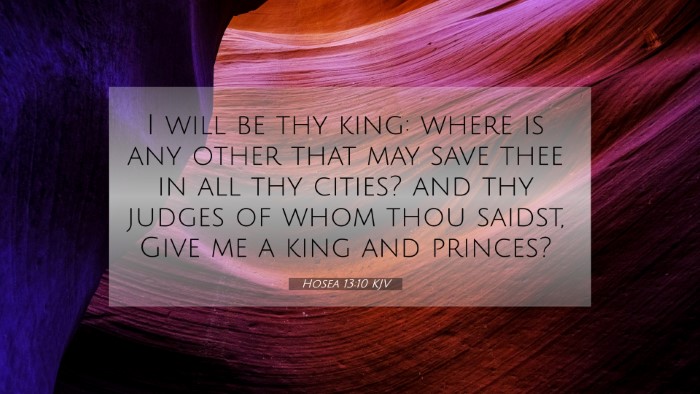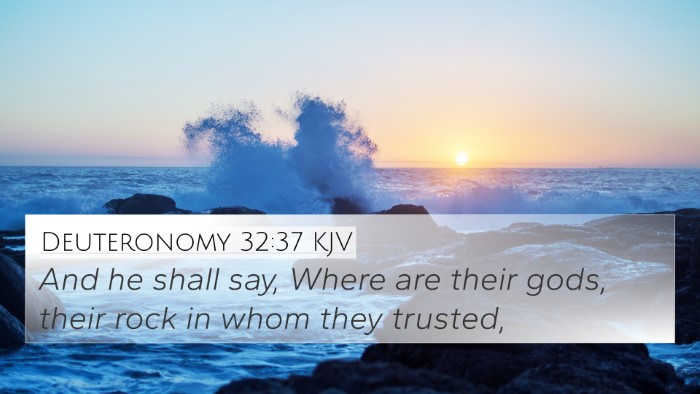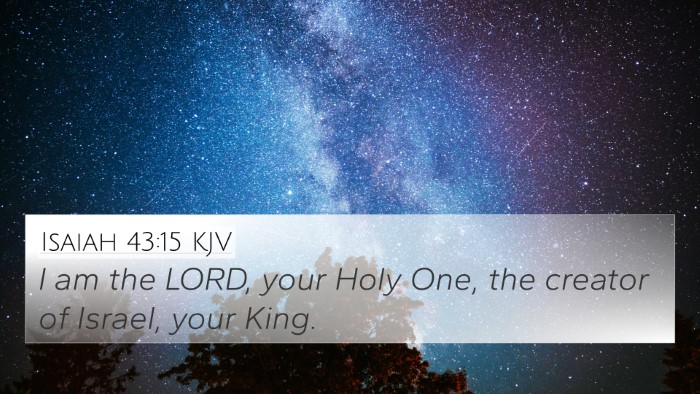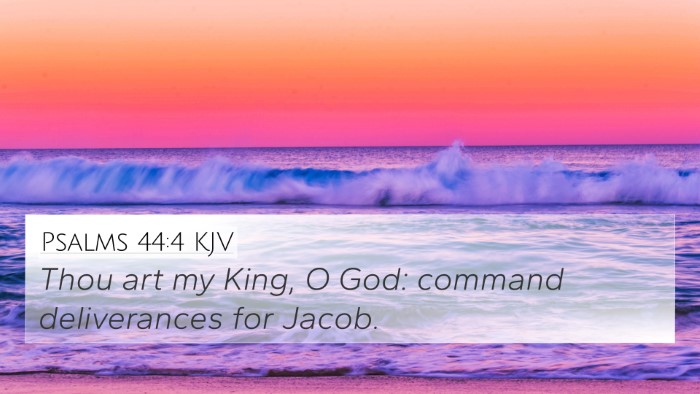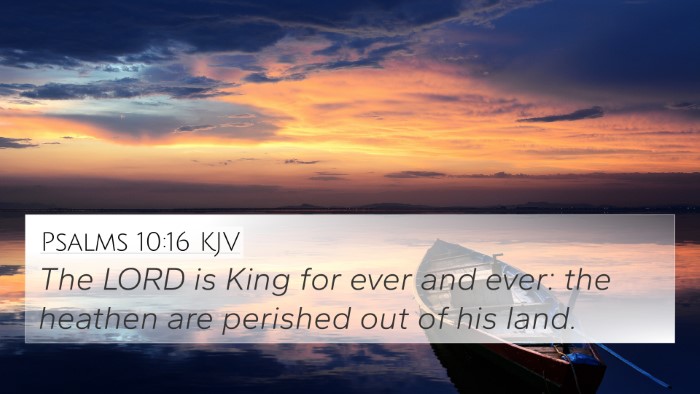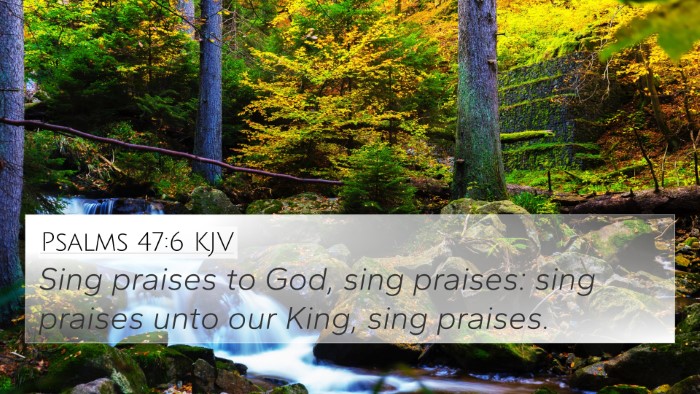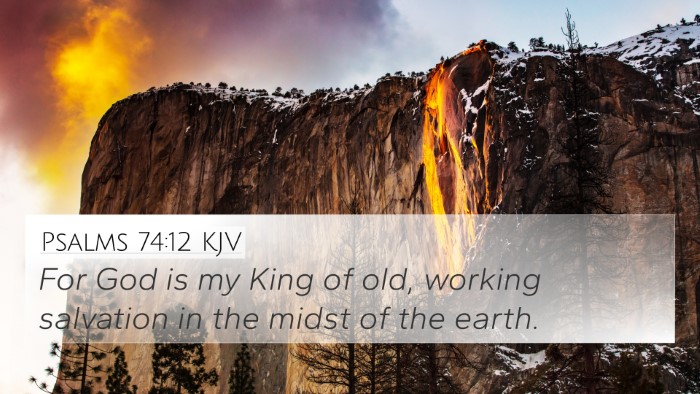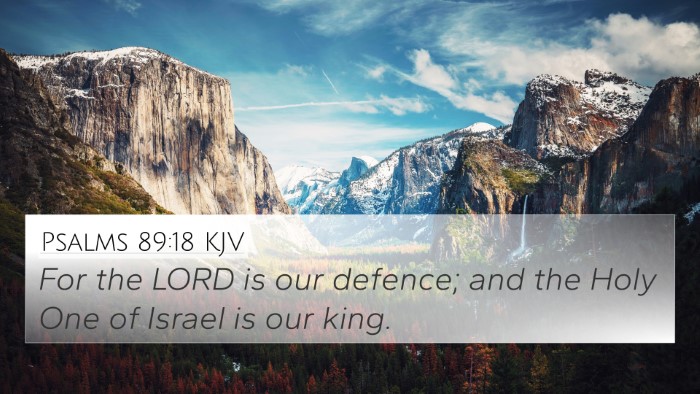Old Testament
Genesis Exodus Leviticus Numbers Deuteronomy Joshua Judges Ruth 1 Samuel 2 Samuel 1 Kings 2 Kings 1 Chronicles 2 Chronicles Ezra Nehemiah Esther Job Psalms Proverbs Ecclesiastes Song of Solomon Isaiah Jeremiah Lamentations Ezekiel Daniel Hosea Joel Amos Obadiah Jonah Micah Nahum Habakkuk Zephaniah Haggai Zechariah MalachiHosea 13:10 Similar Verses
Hosea 13:10 Cross References
I will be thy king: where is any other that may save thee in all thy cities? and thy judges of whom thou saidst, Give me a king and princes?
Uncover the Rich Themes and Topics of This Bible Verse
Listed below are the Bible themes associated with Hosea 13:10. We invite you to explore each theme to gain deeper insights into the Scriptures.
Hosea 13:10 Cross Reference Verses
This section features a detailed cross-reference designed to enrich your understanding of the Scriptures. Below, you will find carefully selected verses that echo the themes and teachings related to Hosea 13:10 KJV. Click on any image to explore detailed analyses of related Bible verses and uncover deeper theological insights.
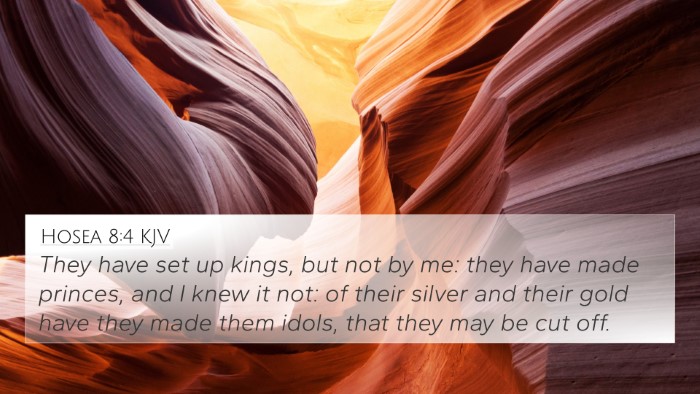
Hosea 8:4 (KJV) »
They have set up kings, but not by me: they have made princes, and I knew it not: of their silver and their gold have they made them idols, that they may be cut off.
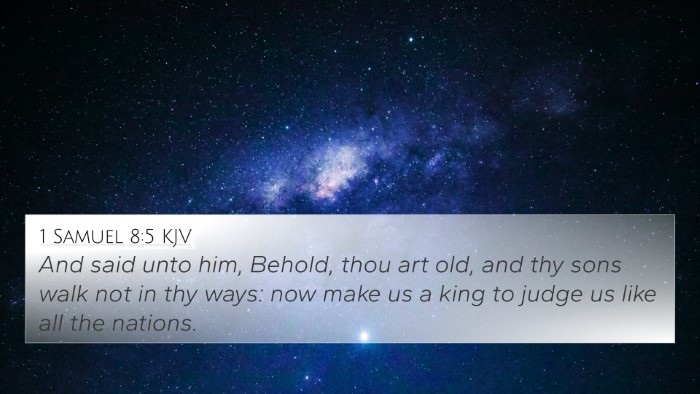
1 Samuel 8:5 (KJV) »
And said unto him, Behold, thou art old, and thy sons walk not in thy ways: now make us a king to judge us like all the nations.
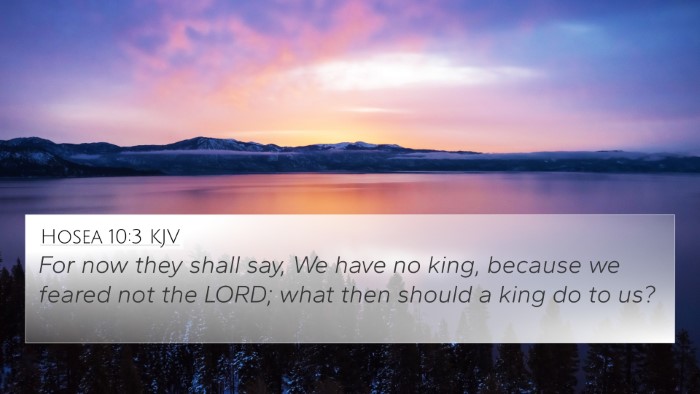
Hosea 10:3 (KJV) »
For now they shall say, We have no king, because we feared not the LORD; what then should a king do to us?
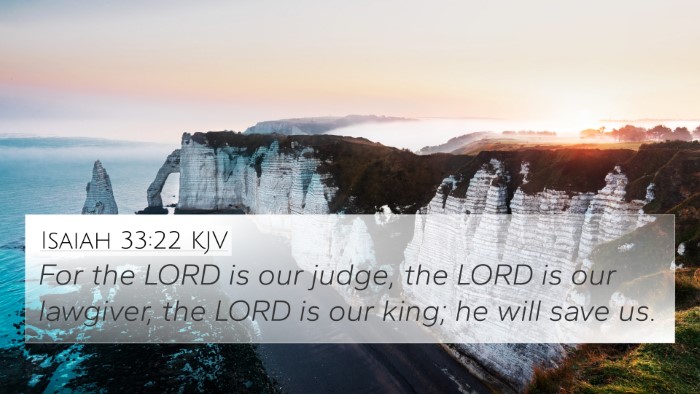
Isaiah 33:22 (KJV) »
For the LORD is our judge, the LORD is our lawgiver, the LORD is our king; he will save us.
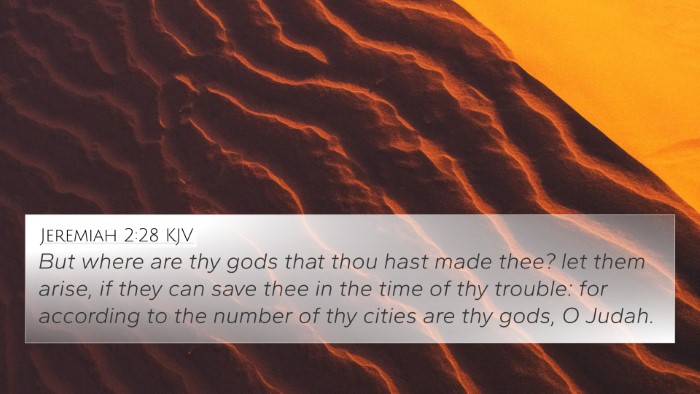
Jeremiah 2:28 (KJV) »
But where are thy gods that thou hast made thee? let them arise, if they can save thee in the time of thy trouble: for according to the number of thy cities are thy gods, O Judah.
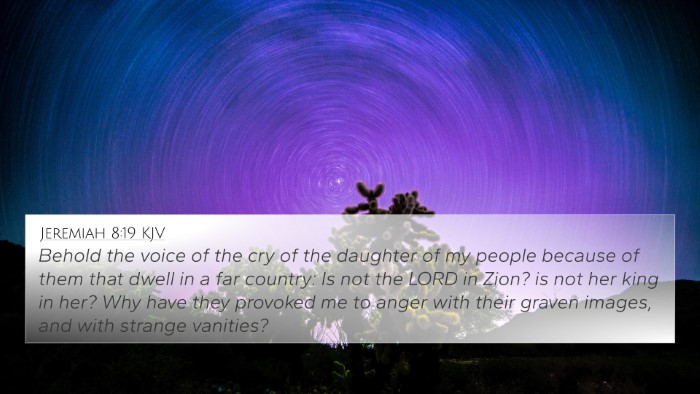
Jeremiah 8:19 (KJV) »
Behold the voice of the cry of the daughter of my people because of them that dwell in a far country: Is not the LORD in Zion? is not her king in her? Why have they provoked me to anger with their graven images, and with strange vanities?
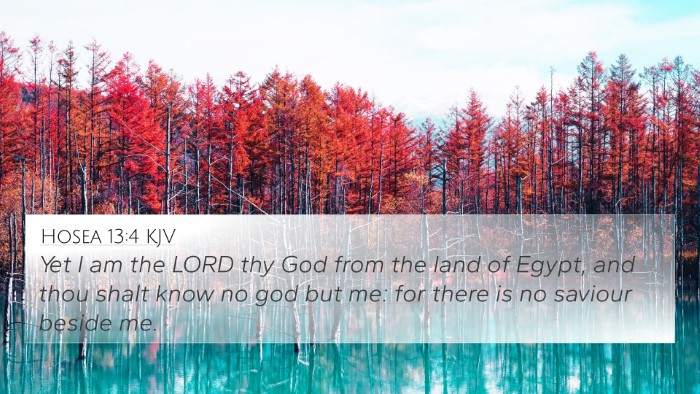
Hosea 13:4 (KJV) »
Yet I am the LORD thy God from the land of Egypt, and thou shalt know no god but me: for there is no saviour beside me.
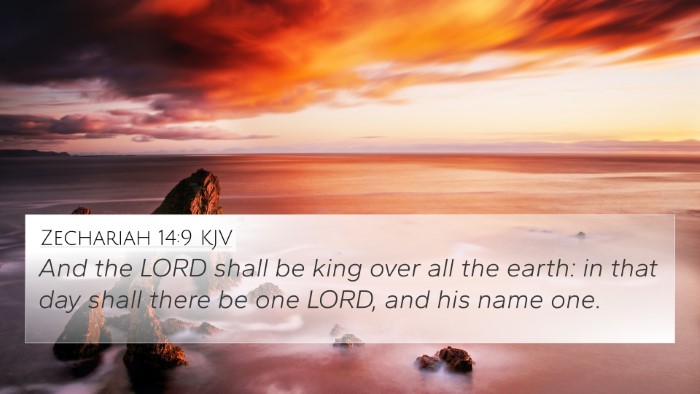
Zechariah 14:9 (KJV) »
And the LORD shall be king over all the earth: in that day shall there be one LORD, and his name one.
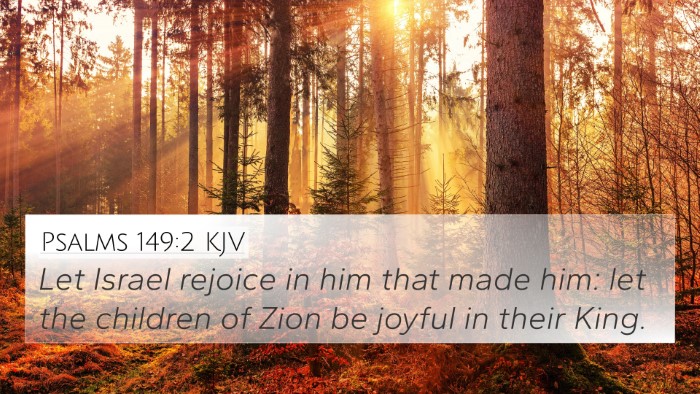
Psalms 149:2 (KJV) »
Let Israel rejoice in him that made him: let the children of Zion be joyful in their King.
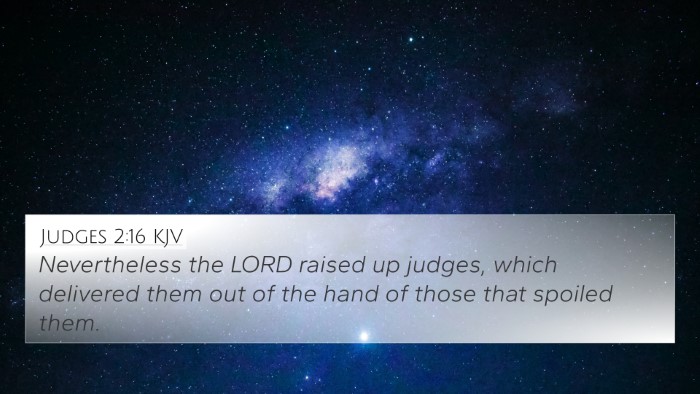
Judges 2:16 (KJV) »
Nevertheless the LORD raised up judges, which delivered them out of the hand of those that spoiled them.
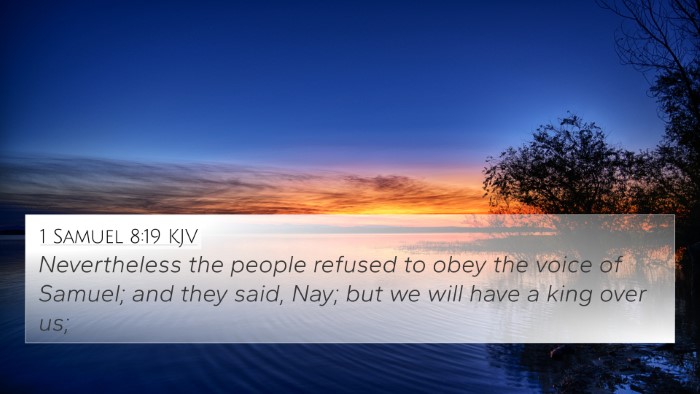
1 Samuel 8:19 (KJV) »
Nevertheless the people refused to obey the voice of Samuel; and they said, Nay; but we will have a king over us;

1 Samuel 12:11 (KJV) »
And the LORD sent Jerubbaal, and Bedan, and Jephthah, and Samuel, and delivered you out of the hand of your enemies on every side, and ye dwelled safe.
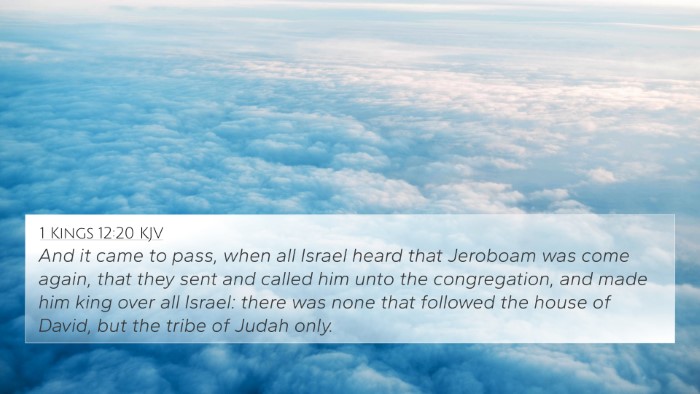
1 Kings 12:20 (KJV) »
And it came to pass, when all Israel heard that Jeroboam was come again, that they sent and called him unto the congregation, and made him king over all Israel: there was none that followed the house of David, but the tribe of Judah only.

2 Kings 17:4 (KJV) »
And the king of Assyria found conspiracy in Hoshea: for he had sent messengers to So king of Egypt, and brought no present to the king of Assyria, as he had done year by year: therefore the king of Assyria shut him up, and bound him in prison.
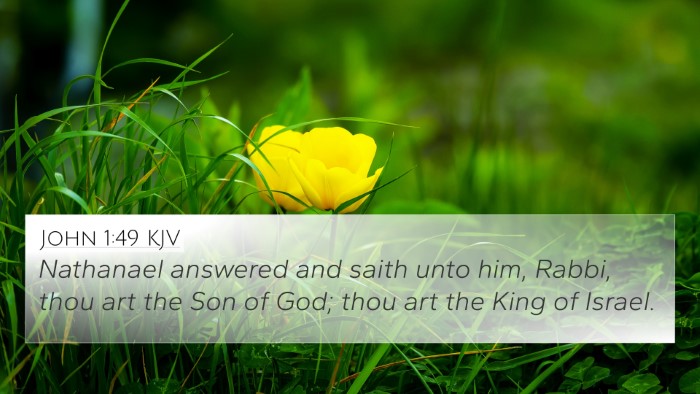
John 1:49 (KJV) »
Nathanael answered and saith unto him, Rabbi, thou art the Son of God; thou art the King of Israel.
Hosea 13:10 Verse Analysis and Similar Verses
Understanding Hosea 13:10
Hosea 13:10 states: “Where is your king now, that he may save you in all your cities? And your judges, to whom you said, ‘Give me a king and princes’?” This verse reflects a poignant moment where God questions Israel regarding their misplaced trust in earthly rulers rather than in Him.
Verse Meaning Summary
This verse captures a significant aspect of Israel's spiritual journey, showcasing their demand for a king as a rejection of God’s sovereignty. It serves as a poignant reminder of the folly of seeking security in human leaders rather than anchoring faith in divine providence.
Insights from Commentaries
-
Matthew Henry:
Henry emphasizes the absurdity of turning to political leaders when they were once under God’s direct governance. The question posed by God serves to reveal the impotence of any king or judge in times of crisis.
-
Albert Barnes:
Barnes highlights that this verse speaks to the Israelites’ demand for a monarch, which ultimately weakened their reliance on God, leading to their downfall. He notes that God’s questioning signifies the absence of true help that any earthly king can provide.
-
Adam Clarke:
Clarke draws attention to the consequences of Israel's demand for a king, stating that they have abandoned the Lord for a human ruler. His insight portrays the futility of human governance devoid of divine authority.
Cross-References and Thematic Connections
This verse connects with various other scriptures, demonstrating the overarching theme of God’s authority versus human authority. Here are some significant cross-references:
- 1 Samuel 8:7-9: This passage recounts Israel's request for a king, showcasing their desire to conform to the practices of surrounding nations.
- Psalm 118:8-9: These verses declare trust in God over mankind, reinforcing the message regarding seeking divine over human leadership.
- Jeremiah 2:13: God laments that His people have forsaken Him, the source of living water, and sought satisfaction in broken cisterns (false gods).
- Isaiah 31:1: This warns against seeking help from humanity instead of relying on God, underscoring the same theme present in Hosea.
- Proverbs 29:12: Discusses how if a ruler listens to lies, all his ministers become wicked, highlighting issues with flawed governance.
- Isaiah 41:20: This verse shows God's intention to demonstrate His power among the nations, contrasting human efforts with divine intervention.
- Micah 3:1-3: These verses criticize the leaders of Israel for their corruption, noting that God would hold them accountable.
Applying the Principles
The lessons from Hosea 13:10 extend beyond ancient Israel. In contemporary applications, believers are invited to reflect on their own lives:
- Consider where trust is placed during times of uncertainty.
- Recognize the limits of human authority in providing true security.
- Strengthen dependence on God’s wisdom through prayer and scriptural meditation.
Tools for Bible Cross-Referencing
For deeper exploration, several tools for Bible cross-referencing can facilitate comparative study and understanding of connections:
- Bible Concordance: A reference tool that allows readers to locate verses based on keywords.
- Bible Cross-Reference Guide: A systematic approach to link verses across the Bible.
- Cross-Reference Bible Study: Methods for systematically studying interconnected scriptures.
- Bible Reference Resources: Comprehensive materials that assist in discovering verse connections.
Concluding Thoughts
Hosea 13:10 serves as a timeless reminder of the necessity to place trust in God above earthly rulers. Through the insights gathered from esteemed commentaries and cross-referencing with other scriptural texts, believers can gain a holistic understanding of God's covenant faithfulness despite human failures. This exploration ultimately encourages a deeper faith rooted in Divine assurance, far beyond the transient nature of earthly authorities.
